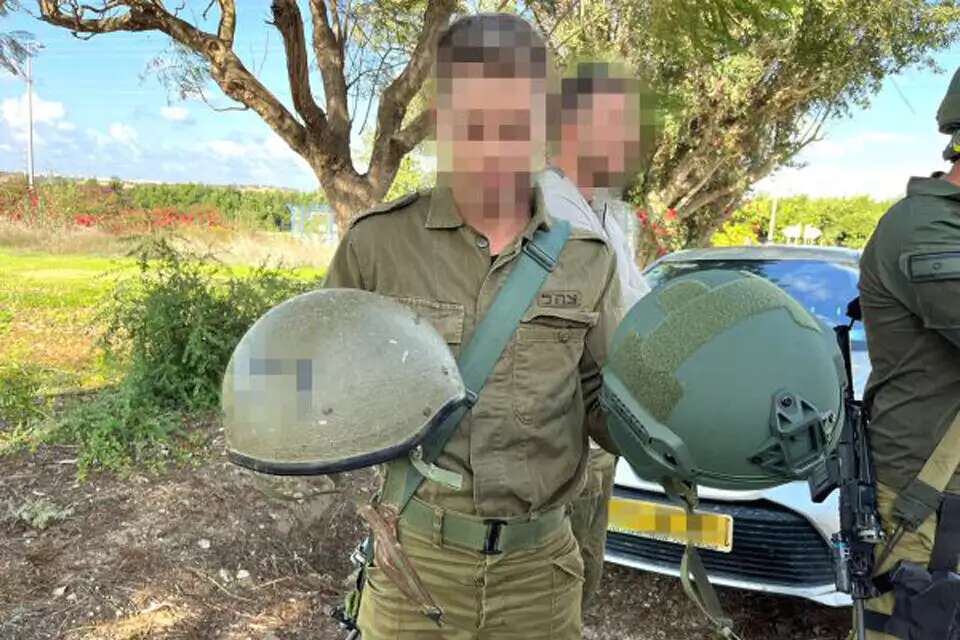The "Am Yisrael Chai" project has raised $1.5 million to buy 4,000 tactical helmets, and 25,000 pieces of clothing, including tactical uniforms, fireproof overalls, and winter gear, and is literally saving lives
The equipment many soldiers have received from the army is inadequate. Good people from the United States give them Kalashnikov-proof helmets, ceramic vests, armored backpacks, tactical uniforms, telescopic sights, G-shock watches, and winter clothes to keep them warm – free of charge, and in keeping with the strictest American standards.
One Jewish community from the New York area is behind this worldwide operation aimed at saving lives and which brings to mind arms smuggling operations to Israel during the War of Independence. The project, which developed quite by chance is aptly called "Am Yisrael Chai" – The People of Israeli live. For now, the people involved in the project do not want to be exposed. "You see, I'm not a 'professional Jew, says David (not his real name), the driving force behind the project. "I've never been involved in donating to Israel or the IDF, and I don't think that's my job either. But this is about saving soldiers' lives and I can't just sit by and watch."
We hurry south in a taxi van crammed with huge bags full of expensive equipment. 'David' is about 30 years old, a resident of the New York area, who is in the clothing business. When the war broke out, a non-Jewish American colleague sold him at cost dozens of tactical uniforms that had been destined for the New York National Guard as a gesture of aid to Israel. The community raised the money.
That was how the project started out at the beginning of the war, but it soon became clear that the soldiers' needs were much greater than comfortable uniforms. "From a conversation with a relative, a soldier heading into Gaza, I understood that his helmets and those of his friends were old and not up to standard. I got them new helmets from the US Army, which can withstand the impact of 7.62mm bullets. We tested them to see that they met the required standards and brought them to the soldiers. Word began to spread and I received more and more requests, and since then they haven't stopped."
Our taxi van approaches the Gaza border area and David announces that our first stop will be Zikim. On the way, he receives non-stop messages on his phone with more and more requests for equipment, one of them, from a deputy team commander in the 80th Brigade: "We managed to get hold of many things that we were short of, but we still need tactical helmets (which are lighter and therefore we can work better with them) and lighting kits for night-time face identification. The military provided pretty inefficient kits, where we can't replace batteries, but have to charge through a socket. If you help with those, that would be great."

Another message reads: "Hey man, can you help my team with this? Red dot sights, Trijicon reflector sights mirrors, laser sights, tactical rifle lights, Mitch ballistic helmets, sleeping bags." It's been like that for the past two months. David's response is "I'd be happy to help." He is furious with the army: "I don't understand how soldiers are sent in with substandard equipment that puts their lives in danger. It's terrible. Where is Bibi? Where is the defense minister?"
David and his group have already brought 11 shipments into Israel. Donations are collected in the United States and equipment is purchased there. Community members bring it with them to Israel, sort and store it according to characteristics and sizes. Once every few days, a party goes down to the Gaza Envelope, where the soldiers meet with the anonymous donors and receive the equipment they need.
So far, the volunteer group has spent $1.5 million to buy 4,000 tactical helmets, and 25,000 pieces of clothing, including tactical uniforms, fireproof overalls, and winter gear. Deliveries have also been sent to soldiers on the northern border. Some of the clothes were given to residents of the south who were evacuated to hotels, "left home for a week" and were left penniless. For them, David and his friends are lifesavers.
Our first meeting is with a reserve force from the Maglan commando unit attached to one of the brigades operating in Gaza. The taxi comes to a stop somewhere near Zikim. The Maglan soldiers are waiting on the side of the road. They say only half of them have tactical helmets, while the rest walk around wearing helmets that are at least 15 years old.
David gets straight to work, unloads the new equipment, and asks the soldiers to measure it. They are absolutely delighted. "At the start of the war, our commander told us not to go after donations because that paints the army in a bad light, but we saw that everyone else was doing it and getting proper protective gear, so we asked for it too," one of the soldiers says.
The difference in quality between the equipment David has brought and the equipment the soldiers have is startling. We compare the old, uncomfortable helmets with those brought from the United States. The soldiers are overjoyed and extremely grateful. Later they will get coats, G-shock watches, and telescopic sights.
As David hands out the equipment, another team of soldiers arrives, and their needs are also met. With the help of Micah, the shrewd taxi driver who helps David and the soldiers communicate, the group films a short video to be sent to the community to show them where the money is going and how satisfied the soldiers are. It ends with the words: "Am Yisrael Chai."
The IDF isn't fully aware of the scope of the operation and claims that the equipment distributed to soldiers meets its strict standards, but the question is what standards does the IDF have; I saw with my own eyes helmets that are 15 or even 35 years old. When the defense minister, for example, enters Gaza, he wears the older helmets, not tactical helmets like those David and his friends are providing to the soldiers.
The first drop off is done and we proceed to Camp Reim and then Tze'elim, Kibbutz Be'eri, and other locations until nightfall. David reads out to me the list of all the units that contacted him over the past two months: Among them Sayeret Matkal, all the reconnaissance units, and the Israeli Air Force combat rescue unit, 669. The names, countless pictures, the unit numbers that roll off David's tongue show that everything he is saying is true. The donations and logistic assistance organized by the New York community are literally saving lives. Indeed, the People of Israel are alive.
An IDF spokesperson said: "The IDF works night and day to provide protective equipment for IDF soldiers, both regular forces and reserves, from personal protective equipment and weapons to winter equipment. All equipment is inspected and distributed in line with prioritization of missions. To date, the procurement of combat equipment of thousands of ceramic vests, winter equipment, and more has been accelerated, and a number of regional logistics centers have been deployed to improve the response for forces on the ground.
"The Technology and Logistics Directorate works to provide every soldier with the necessary operational equipment. Shortcomings are examined and dealt with accordingly. In addition, the IDF has opened a call center that deals with all logistical needs that may arise and is available 24/7 for IDF service men and women, on WhatsApp at 052-6156256."




